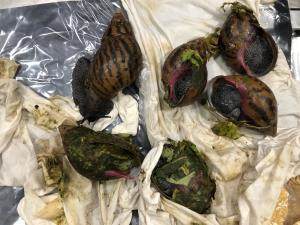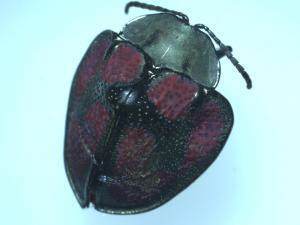Inspectors intercepted pests in Texas and Michigan
By Diego Flammini
Staff Writer
Farms.com
On a typical day, Customs and Border Protection (CBP) ag specialists intercept about 264 pests and 2,548 materials for quarantine.
And CBP ag specialists in two states recently stopped pests from entering the country before they could damage crops and other plants.
On March 17, inspectors at Detroit Metropolitan Airport in Detroit, Mich., found six live giant African snails in luggage arriving from Ghana.

Giant African snails found in luggage (CBP photo).
The traveler planned on eating the snails, CBP said.
In Nigeria, for example, the snails are eaten as bar snacks.
In the U.S., however, giant African snails are listed as a “prohibited organism” because of the damage they can cause.
The snails, which can reach almost eight inches in length and five inches in diameter, feed on at least 500 different plants including peanuts, beans, peas, cucumbers and melons.
These pests, which can produce up to 2,500 eggs per year, will also feed on tree bark, and paint and stucco on houses.
In addition, they carry the rat lungworm parasite, which can cause meningitis in humans.
Keeping this pest out of the U.S. is crucial for human and plant health, a CBP official said.
“Our CBP officers and agriculture specialists work diligently to target, detect, and intercept potential threats before they have a chance to do harm to U.S. interests,” Port Director Robert Larkin said in a statement. “The discovery of this highly invasive pest truly benefits the health and well-being of the American people.”
A little more than a week prior to the discovery in Michigan, CBP ag inspectors in Texas also stopped a pest from entering the United States.
On March 7 at the Progreso International Bridge in Progreso, Texas, inspectors found a bug while examining the trailer floor of a Mexican pineapple shipment.
One day later, an entomologist identified the pest as a tortoise beetle. This is the first time this pest has been discovered at this port of entry.
The tortoise beetle is a member of the Cassidinae, a subfamily of leaf beetles.

Tortoise beetle (CBP photo)
These insects feed on multiple crops and plants including sweet potato, cabbage, corn and strawberries.
The CBP agents denied the pineapples entry and re-exported them to Mexico.
“CBP Agriculture Specialists play a vital role in safeguarding our frontline by protecting the agriculture industry which in turn protects our economy. “The vigilance displayed by CBP Agriculture Specialists at the Port of Progreso is a prime example of their commitment to the CBP mission,” Port Director Walter Weaver, Progreso/Donna Port of Entry, said in a statement.